初二下unit8_I'll_help_to_clean_up_the_city_parks_单元测试题
初中英语《Unit8I'll help to clean up the city parks》教学课件设计

2. Help clea_nu_pthe c_itypark. 3. Visit _the_o_ld p_e_o_plein t_h_e_o_l_dp_eople_’s
home.
4. _Help_you_n_gkid_s_to lea_rn Engli_sh_.
(headmaster)
Volunteering at Hope Project
Good morning ,everyone! I’m a student from No.1 Middle school. Next Sunday our school will have a volunteer activity at Hope Project. Here are our plans. First…….. Then…….. Next……… At last……..
take out the trash help plant trees
help classmates with school work cheer the sick up
clean up the streets
help the old to cross the street
visit the old people and cheer them up
his life. Now Ben’s life has changed so much. I’m happy
to s_e_e(see) the look of joy on his face.
After reading 1 Try to retell the passage.
Because of her_kind_ness
初二英语下册Unit8_I’ll_help_to_clean_up_the_city_parks知识点详解

Unit8 I’ll help to clean up the city parkshelp sb with sth help oneself to sth随便吃&可数名词欢呼We all cheered when EXO arrived.We heard the cheers when EXO arrived.练习:He failed in the test and looks sad, let’s_____.A put him upB set him upC cheer him upD clean him up分发= hand out 散发(光、热)用完,耗尽印制出 B giving out C selling out D putting out扑灭(后接名词、代词、动名词作宾语)收起来put on穿上put out扑灭;伸出put up张贴,搭建put back放回原处可数名词:公告牌,通告,布告Take notice of what I say.notice sb doing sth/notice sb do sth…(现在不了) 没有人称和时态变化习惯于(一直在做)Be used to do被用来做Be used for+n/ doing被用于…Eg:Stamps are used for sending mails.练习:She goes to climb mountains every Sunday.But she _______ hate climbing mountains.B was used toC is used toD is used forLonely是adj孤单的(感情色彩较强)alone既是adj单独的,独自He feels lonely without friends. He is alone in the room.独自呆在房间’t feel .every强调全部、都The sun shines day this month. 这个月每天都阳光灿烂。
Unit 8 I’ll help clean up the city parks
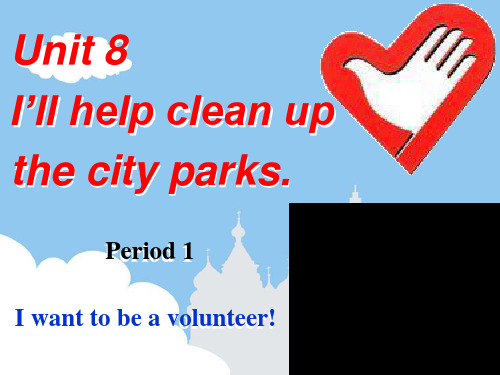
Shanghai.
A poem
基于爱心的呼唤是最深沉的呼唤 处于自愿的事业是最有生命力的事业
and
...?
and
...?
Volunteers Wanted
We need volunteers to helps us. If you’d like to play sports. You could train the soccer team. If you____, you could _____…… Being a volunteer is great. Welcome to join us!
Important expressions:
1. clean up
打扫干净
2. stop hunger 阻止饥饿
3. sick children 生病的孩子
4. cheer up
使……快乐
5. give out
分发
6. homeless people 无家可归的人
7. food bank
食物银行
8. after-school study program 课后学习活动
4. _C__u_t_u_p____ these potatoes. I’ll cook them. 5. I will _h_e__lp__w__it_h__ some housework after I finish
my work.
6. Please _w_r_i_t_e_d_o__w_n__ what I said just now.
英语人教版八年级下册I help to clean up the

6.He is very clever and understand s many English words,even some difficult oneslike“upstairs”.他很聪明,懂得许多英语单词,甚至像“upstairs”这样一些很难的词。
ones是一个代词,常用来表示泛指,替代上文中出现过的可数名词复数形式,表示与其类似的“一些”。
在句中出现时常使用形容词对其进行修饰限定。
These books are too hard.Can you lend me some easier ones?这些书太难了,你能不能借一些简单的给我?注意代替上文出现的同类事物的单数名词用one。
I can't find my hat.I think l must buy one.我找不到我的帽子,我想我必须买一顶。
7.You donation is greatly appreciate d and the money is well used tohelp disable d people like me.非常感谢你的捐赠,这些钱会被很好地用来帮助像我这样的残疾人。
(1)Your donation is greatly appreciated直译为“你的捐赠行为是非常受感激的”。
appreciated是动词appreciate的过去分词形式。
appreciate表示“感谢”,通常不用于进行时。
appreciate 还有“欣赏;赏识;重视”的意思。
其后可接名词或动名词,但不可跟不定式。
I appreciate having time to take a vacation.我很高兴有时间度假。
I appreciate your help.我感谢你的帮助。
(2)句中be well used to意为“被充分用来……”,是被动语态,其中to是不定式符号。
四.达标测评一.单选1.“I don’t know where Wenchuan County is” “ Let me _____ a map of China for you”A.takeB. bringC. fetchD. carry2. The box is _______ books.A. fill withB. full ofC. filled ofD. full with3 I’d like to thank you for ______ money to “Animal Helpers”.A. sendingB. sendC. to sendD. sent4. I’m ______ at this dog.A. amazingB. amazeC. amazedD. surprising5. They improved the software to make ______ easier for people to use computers.A. thatB. thisC. theseD. it6. Please ______ the cup _____ milk or water.A. filled; withB. fill; useC. fill; withD. fill; of7. I’m going to see my friend ______ is ill in bed after school.A. whichB. whoseC. whoD. whom二.根据句意和首字母提示完成单词1.Tom went into his room and s________ the door behind him.2.The boys often help the old man c________ water and sweep the floor.3.The dog f_______ the stick that we had tossed(仍)。
英语人教版八年级下册I will help to clean up the
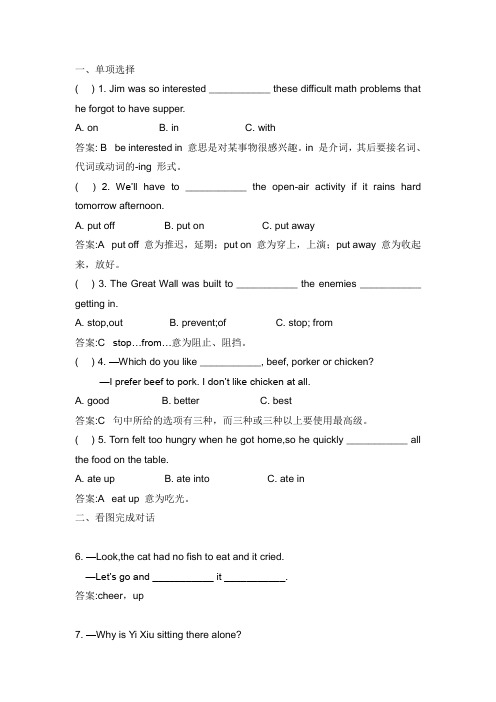
一、单项选择( ) 1. Jim was so interested ___________ these difficult math problems that he forgot to have supper.A. onB. inC. with答案: B be interested in 意思是对某事物很感兴趣。
in 是介词,其后要接名词、代词或动词的-ing 形式。
( ) 2. We’ll h ave to ___________ the open-air activity if it rains hard tomorrow afternoon.A. put offB. put onC. put away答案:A put off 意为推迟,延期;put on 意为穿上,上演;put away 意为收起来,放好。
( ) 3. The Great Wall was built to ___________ the enemies ___________ getting in.A. stop,outB. prevent;ofC. stop; from答案:C stop…from…意为阻止、阻挡。
( ) 4. —Which do you like ___________, beef, porker or chicken?—I prefer beef to pork. I don’t like chicken at all.A. goodB. betterC. best答案:C 句中所给的选项有三种,而三种或三种以上要使用最高级。
( ) 5. Torn felt too hungry when he got home,so he quickly ___________ all the food on the table.A. ate upB. ate intoC. ate in答案:A eat up 意为吃光。
人教版初中初二八年级英语下册 名师教学课件Unit 8 I'll help clean up the
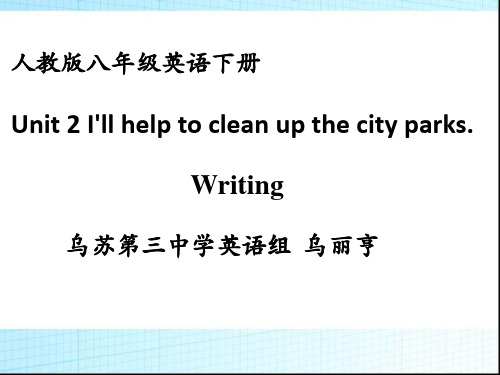
Write
Check
Volunteer Day is coming, our group wants to go to the old people’s home and visit the old people, we can do many things.
I’d like to talk to the old people, Bob hopes to clean up the rooms, Lily volunteers to make dumplings for old people, Jim could sing and dance to them and cheer them up. Old people can tell us stories about the past and how things used to be.
A lot of …
Evaluate Your Writing(评价作文):
1.including all the main points(要点齐全) 2.no grammar or spelling mistakes(语句正确) 3.beautiful handwriting(书写美观) 4.good words and sentences(有好词好句)
I volunteer togive our old books to “Hope
School”.
cheer up the sick kids
…
Talk about our volunteering plan
Example: A: What volunteer work will you choose in the future? B: I want\decide\plan ... A: Why do you choose it? B: Because … A: What will you do there? B: I … How about your plan? A: I ... Because ... I ...
初中英语人教版八年级下册I’ll help to clean up the city
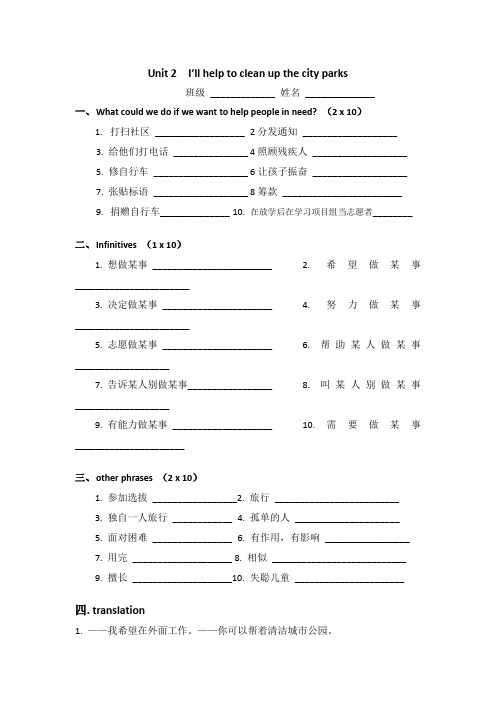
Unit 2 I’ll help to clean up the city parks班级_____________ 姓名______________一、W hat could we do if we want to help people in need? (2 x 10)1.打扫社区__________________ 2分发通知___________________3. 给他们打电话_______________ 4照顾残疾人___________________5. 修自行车___________________ 6让孩子振奋___________________7. 张贴标语___________________ 8筹款________________________9. 捐赠自行车______________ 10. 在放学后在学习项目组当志愿者________二、I nfinitives (1 x 10)1. 想做某事________________________2. 希望做某事_______________________3. 决定做某事______________________4. 努力做某事_______________________5. 志愿做某事______________________6. 帮助某人做某事___________________7. 告诉某人别做某事_________________ 8. 叫某人别做某事___________________9. 有能力做某事____________________ 10.需要做某事______________________三、o ther phrases (2 x 10)1. 参加选拔_________________2. 旅行_________________________3. 独自一人旅行____________4. 孤单的人_____________________5. 面对困难________________6. 有作用,有影响_________________7. 用完____________________ 8. 相似___________________________9. 擅长____________________10. 失聪儿童______________________四. translation1. ——我希望在外面工作。
初中英语人教版八年级下册I'll help to clean up the city
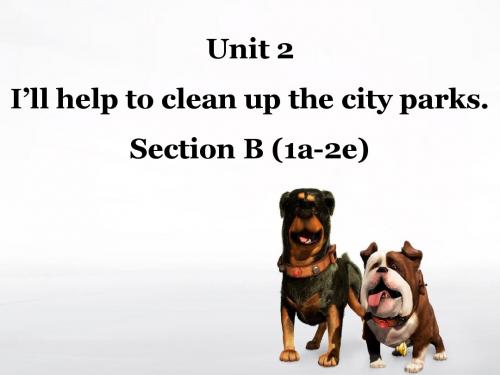
1c Listen and number the pictures [1- 4] in the
correct order.
4
2
1
3
1d Listen again. Circle T for true or F for false. 1. Jimmy fixes up broken bicycle parts, like wheels. 2. Jimmy sells bikes. 3. Jimmy takes after his mother.
T F
F T
4. Jimmy has run out of money.
Disabled people have many difficulties.
be blind
be deaf and be unable to speak
be unable to use hands
be unable to walk
Scanning策略:根据题干中问到的内容,扫描文章中的关键词
Read paragraph 2 carefully and answer the questions.
1. What’s the matter with Ben Smith? He can’t use his arms or legs well. ______________________________________________ 2.What kinds of things are difficult for him? Normal things like answering the telephone, opening ______________________________________________
Unit 8 I’ll help to clean up the city parks.
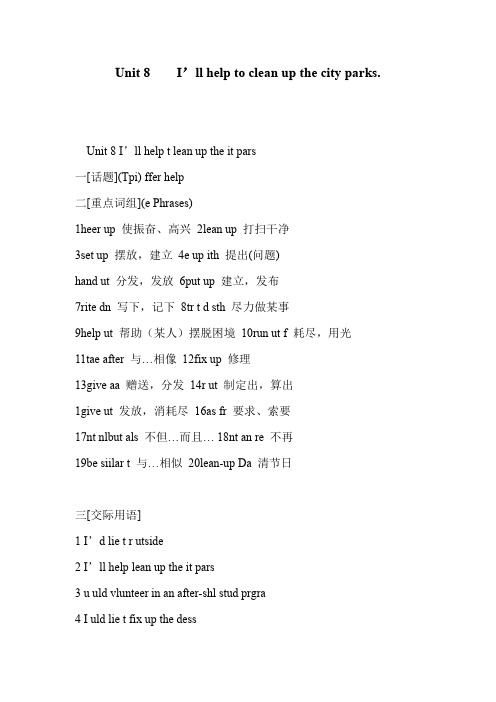
与tae after意思相近的词组还有l lie (看去像……)、be lie (像……一样)等。
h des the b l lie?这个男孩看上去像谁?
His brther is lie his father, isn’t he?他的哥哥像他爸爸,对吗?
Than sb fr…为……而感谢某人
eg Than u fr ur flers t e
Set up…引导的是一个省去关系代词that的定语从句
eg Thas has a lab set up hiself
8 Being blind, deaf, unable t al ,r use ur hands easil is sething that st peple annt iagine
在某些情况下,uld并不表示过去,只是表示委婉、客气的语气。其肯定答语用:Sure/ertainl/All right等。否定答语用:Srr/Srr, I an’t等。
A: uld u tell e if he is a student?你能告诉我他是不是学生吗?
B: Sure当然可以。
(2)lean up是省去t的动词不定式,意为“(把……)打扫干净”、“梳理整齐”。
need是一个常见的动词,表示“需要”之意。它既可以作实义动词,也可以作情态动词。其具体用法如下:
(1)need用作实义动词,有“必要”、“必需”之意,有人称、数和时态的变化,可以接名词、代词、动名词或带t的动词不定式作宾语,构成疑问句和否定句时要借助于助动词。
The an needs an English ditinar hen he rs这个人在工作时需要一本英语词典。
英语人教版八年级下册I’ll help clean up the city pa
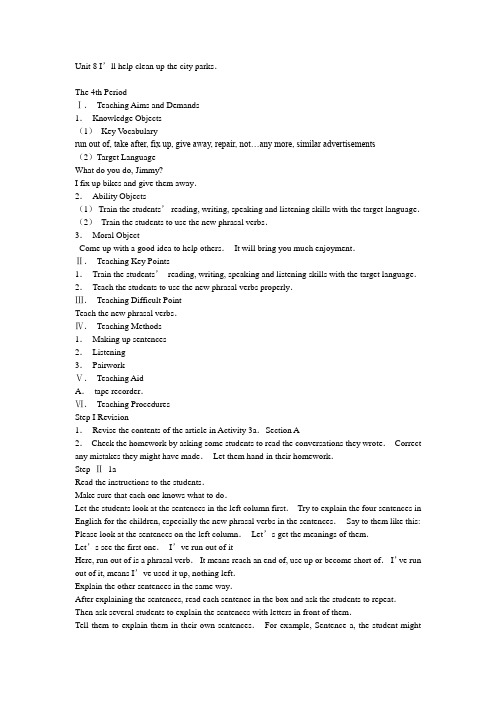
Unit 8 I’ll help clean up the city parks.The 4th PeriodⅠ.Teaching Aims and Demands1.Knowledge Objects(1)Key Vocabularyrun out of, take after, fix up, give away, repair, not…any more, similar advertisements(2)Target LanguageWhat do you do, Jimmy?I fix up bikes and give them away.2.Ability Objects(1)Train the students’reading, writing, speaking and listening skills with the target language.(2)Train the students to use the new phrasal verbs.3.Moral ObjectCome up with a good idea to help others.It will bring you much enjoyment.Ⅱ.Teaching Key Points1.Train the students’reading, writing, speaking and listening skills with the target language.2.Teach the students to use the new phrasal verbs properly.Ⅲ.Teaching Difficult PointTeach the new phrasal verbs.Ⅳ.Teaching Methods1.Making up sentences2.Listening3.PairworkⅤ.Teaching AidA.tape recorder.Ⅵ.Teaching ProceduresStep I Revision1.Revise the contents of the article in Activity 3a.Section A2.Check the homework by asking some students to read the conversations they wrote.Correct any mistakes they might have made.Let them hand in their homework.Step Ⅱ1aRead the instructions to the students.Make sure that each one knows what to do.Let the students look at the sentences in the left column first.Try to explain the four sentences in English for the children, especially the new phrasal verbs in the sentences.Say to them like this: Please look at the sentences on the left column.Let’s get the meanings of them.Let’s see the first one.I’ve run out of itHere, run out of is a phrasal verb.It means reach an end of, use up or become short of.I’ve run out of it, means I’ve used it up, nothing left.Explain the other sentences in the same way.After explaining the sentences, read each sentence in the box and ask the students to repeat.Then ask several students to explain the sentences with letters in front of them.Tell them to explain them in their own sentences.For example, Sentence a, the student mightrespond.My bicycle was broken.I couldn’t ride it.I got new tires and a new seat.Now it works fine.Read the instructions again and ask the students to match the sentences with similar meanings.Say, Now match the numbered sentences with the lettered sentences in the box.Write the letter of one sentence in front of the number of the matching sentence.Look at the first sentence.The answer has been given.It’s Sentence b.Find out the answers to the other sentences.Check the answers by asking different students to read their matched sentences.Step Ⅲ1bCall the students’attention to the phrasal verbs in the box.Have four different students explain each phrases in their own words.Make sure each student knows the phrasal verbs’meanings.Then ask the students to read the instructions together.Now let’s make sentences with the words in the box.Please look at the sample sentence in your book.Who would like to read it and explain it in your own language?Ask one student to read the sample sentence and explain it.He or she might explain like this: The meaning of this sentence is I give my bicycle to charities without money.Who can make another sentence with give away? Please put up your hands.Ask two or three students who have put up their hands to say their sentences to the class.Correct any mistakes they may make.Then have the students work individually.Make one sentence with each phrasal verb in the box.Tell them to write down their sentences on the lines next to the box.Walk around the classroom as they write.Offer some help to them if they need.Try to remember who have made some wonderful sentences at the same time.After all of them have finished writing, choose some children who have made some wonderful sentences to share theirs with the class.Choose some of the best sentences.Write them on the blackboard.At last, ask the whole class to work in pairs and help each other.Let them check each other’s sentences very carefully.Correct all the mistakes in writing or sentence structures that their partners’may have made.Step Ⅵ2aCall the students’attention to the four pictures.Tell them the boy’s name is Jimmy.Read the instructions to the class.Your task is to number the pictures the correct order while you are listening to the conversation on the tape.But I want to ask you to guess the answer without listening now.Try to put the four pictures in a certain order to show a story of Jimmy by yourselves now.I’ll see whose answers ant correct after we finish doing the listening practice.Then have them give their own order by guessing.After a while, ask several ones to tell their answers to the whole class.Collect two or three answers which many students support on the blackboard.Next, ask some students to tell their own stories on the pictures according to their own orders.After that, ask the students to get ready to listen.Say, We will hear a radio program.A man is interviewing a boy.Write a number in each short line next to each picture while you are listening.Your numbers should be from 1 through 4 andshow which thing they talk about first, second, third and fourth.Play the recording the first time.Students only listen.Then play the recording again.Ask students to number the pictures.Check the answers.Remember to say congratulations to the children who guessed correctly.Step Ⅴ2bRead the instructions together with the children.Make sure that everyone knows what to do.Call the students’attention to the box.Ask four students to read the four sentences to the class.Point to the list of statements and true/false choices.We will listen to the same recording again.Before I play the recording, let’s do like this.—If you can remember the contents of the conversation, please you’re your answers; if you can’t remember the contents, please just guess the answers.It doesn’t matter whether your answers are right or wrong.After a while, have the students get ready to listen.Play the recording again.Ask the students to circle the correct answer to each question—T for true or F for false.Check the answer.Remember to say congratulations to the students who had a good guess before listening.Step Ⅵ2cFirst, play the recording of this lesson again,The students repeat after it.Let the students read after the tape at least twice.Tell them to try their best to copy the pronunciation of the recording.Read the instructions to the class.Tell them they will practice the conversation between Jimmy and the reporter, using the information in the Activities 2a and 2b.Ask a pair of the students to read the model conversation.Write the conversation on the blackboard.Then let them practice their own conversations in pairs.As the pairs work together, more around the room offering help as needed.Ask several pairs to share their conversations with the class.Step ⅦSummarySay, In this class, we’ve learned how to use some new phrasal verbs first.Andwe’ve done much listening practice on the target language.At last, we did some oral practice by making our own conversations.Step ⅧHomework1.Make up one more sentence with each of the phrasal verbs in Activity lb.2.Write out the conversations that you made by yourselves in Activity 2c.Step IX Blackboard DesignUnit 8 I’ll help clean up the city parks.Section BThe Fourth PeriodTarget language:A: What do you do, Jimmy?B:I fix up bikes and give them away.The 5th PeriodⅠ.Teaching Aims and DemandsKnowledge Objects(1)Key Vocabularycall up, hand out, call-in(=phone in), strategy, work out(2)The new and old phrasal verbs.(3)The reading passage.2.Ability Objects(1)Train the students’reading skill on how to make notes.(2)Train the students how to use the phrasal verbs.(3)Train the students’writing and speaking skills.3.Moral ObjectIf you get in trouble in your volunteer work, go to the people around you to ask for help.Ⅱ.Teaching Key Points1.To help the children understand the article.2.To teach the new phrasal verbs.3.To direct the students how to make notes based on an article.Ⅲ.Teaching Difficult Points1.Teaching the new phrasal verbs.2.Directing the children to make notes based on an article.Ⅳ.Teaching Methods1.Giving examples2.Asking questions3.Making notes4.BrainstormingⅤ.Teaching AidsSome pictures on volunteer work, especially a picture on repairing bikes.Ⅵ.Teaching Procedures Step I Revision1.Revise the phrasal verbs that taught last class by asking students to make sentences with them again.2.Check homework by asking students to read their sentences and conversations to the class.3.Revise the story about Jimmy.Step Ⅱ3aWe have learned something about Jimmy.We know he is a Bike boy.He fixes up old bikes and gives them away.But he ran out of his money to buy old bikes last week.Has he come up with any way of getting money? or Will he have to stop?Let’s find out the answer in the article in Activity 3a.Please read the article once quickly and tell me the answer.Have the students scan the passage and catch the main idea of it.After around two minutes, Ask the question again.Step Ⅲ3hWe knew Jimmy had solved his problem.What things did he do to solve his problem? Please make a note of the things that Jimmy did to solve his problem.Ask a student to read the sample sentence in the book.Tell them to write out the things that Jimmy did.Use the sample sentence as a model.And they can reread the article to search for the answers.Let the students complete the work on their own.Walk around the room while they are writing, checking progress and correcting the mistakes they may make while writing.After they all finish writing, ask a few students to give their answers.Point out the mistakes they may have made in writing.After that, write the following words and phrases on the blackboard.call up, hand out, work Out, call-in, strategyTell them to note these new words and phrases in the article, ask children to read the article again.Tell them to read in context, guessing the meanings of new wordsand phrases from the other words around them.Students read the article again for comprehension this time.Allow them to read a little longer this time.After a while, point to the new words and phrases on the blackboard and let the students guess the meanings of them.The teacher does some explanation at the same time.Look at the blackboard now.Let’s explain these new words and phrases one by one.Ask the students to make some sentences with it if time permits.Let them do it as homework if there is no enough time in class.Get the students to read the instructions together.Say, Read the article a third time now.Please underline all the phrasal verbs while you are reading.Ask students to complete the work on their own.Get some students to tell the class their answers.Check the answers with the whole class.Then have them work in pairs.Tell them to check each other’s answers carefully and point out the mistakes their partners may have made.Tell them to help each other like this as often as possible.Write the correct answers on the blackboard to help them.After checking the answers, ask the students to read the article loudly.Teach them to read the new words or even the whole text before they start reading if necessary.Ask them to read for a while, ask one or two to read it to the class, correcting any pronunciation errors they may make.Then ask the whole class to practice reading in pairs.Tell them to read the article loudly in turns in pairs.The one who is listening has to point out his or her partner’s pronunciation errors and help to correct them.If they are not sure about any words, tell them to ask for help from the teacher.After practice reading the article, ask if they have any words or sentences they don’t understand.Tell them to raise their hands and say which words and sentences they don’t understand.Help solve the problems.Step ⅣPart 4Let’s do it in groups of four.Each group will have to brainstorm a plan for helping out in yourcommunity.Talk about it and make notes on where you will help and what you will do.Each group has to write out your own list of possible places and volunteer activities first.Point out the chart in Activity 4.Tell them to note the two given statements Where and What.Your task is to write the places after the word Where and the volunteer activities after the word What.Show some pictures or signs on volunteer activities to help the children come up with some ideas.Let the students work in fours.Brainstorm their plans and write their own lists, using the answers on the blackboard as a model.Walk around the classroom, offering help as necessary.After they all finish brainstorming and writing, tell them to practice together what they will say to the class.Each group will have to report your plan to the class.Now practice together what you will say.You can select one to report mainly and the others complete or you can say in turns.Each one tells about one place.And you can also have one write notes on the board if you wish.Let them practice for a while.Then ask each group to make their presentations.Step ⅤSummarySay, In this class, we’ve read an article about Jimmy.We’ve known Jimmy has got sixteen bikes to fix up and give away.And we’ve learned to make reading notes.We have done some reading, writing, listening and speaking practice using the target language through groupwork.Step ⅥHomework1.Make one sentence with each of the phrasal verbs below, call up, hand out, work out, run out, set up, fix up.2.Try to remember the new words on page 64.Step ⅦBlackboard DesignUnit 8 I’ll help clean up the city parks.Section B The Fifth PeriodNew words and phrases in Activity 3a:call up, hand out, work out, call-in, strategy.Answer to Activity 3a:cheer up, run out, put up, called up, handed out, set up, come up with, fix up, give away.Answers to Activity 3b:1.He did a radio interview.2.He put up signs.3.He called up friends.4.He handed out advertisements.5.He told teachers.Sample answers to Activity 4:Where:1.the city parks 2.…What:1.pick up plastic bags and papersThe 6th PeriodⅠ.Teaching Aims and Demands1.Knowledge Objects(1)Using these phrasal verbs correctly.give away, take after, come up with, give out, hang out(2)Writing an article using the notes given2.Ability Objects(1)Train the students to use the phrasal verbs.give away, take after, come up with, give out and hang out.(2)Train students’writing skill.3.Moral ObjectWhat do you want to be in the future? Try to come up with an idea to get much volunteer experience.It will be good for both you and the others.Ⅱ.Teaching Key Points1.Help the students have a self check on the key words and target language of this unit.2.Practice using the phrasal verbs give away, take after come up with, give out and hang out.3.Direct the students to write an article according to the notes given.Ⅲ.Teaching Difficult Points1.The students make sentences with the phrasal verbs.2.Write the article with the notes given.Ⅳ.Teaching Methods1.Teaching by providing sample sentences2.Teaching by providing sample articleⅤ.Teaching AidA picture of a young woman who is singing.Ⅵ.Teaching ProceduresStep I Revision1.Check the homework by asking the children to show their sentences.Ask some to share their sentences with the class.2.Dictate some new words on page 64.Step ⅡPart 1This activity focuses or vocabulary introduced in the unit.Ask a student to read the instructions.We have two tasks now.First let’s fill in the blanks.Look at the words given in the box.They are all phrasal verbs.Do you know the meaning of each phrasal verb?Who has any problem? Show me by raising your hands.Help solve the problems.Do some explanation if necessary.For example, if someone is not sure about hang out, tell him or her, hang out means spend one’s time lazily.Let them do the work individually.Tell them to choose a correct verb for each blank and note to use the correct forms of the verbs.In some cases, you may need to use an other form of the word, for example adjusting for tense, subject or verb agreement.Move around the room as they write, offering help as needed.Try to remember the common mistakes they may make.After they are finished, ask five different students to read their answers to the class.Correct any mistakes they may have made, especially the verb forms.Encourage the other students to point out their mistakes and help correct them.Point out the common mistakes they may have made at last.After checking the answers together, ask the whole class to check the answers in pairs, exchanging their books and have a careful check.Point out their partner’s mistakes and helpcorrect them.Let the students read the five sentences loudly several times after making sure they all have got right answers.Then go on with the second task.Use the first phrase, give away, as an example.Ask several students to make sentences with it orally.Such as, Jimmy gives away old bikes.Then ask the children to make their own sentences with the phrasal verbs given.Each one writes the sentences on a piece of paper.Move around the classroom while they are writing, checking progress and offering help.Ask some students to share their sentences to the class by reading their sentences to the class.Correct any mistakes they may have made.Ask all the children to hand in their papers.Step ⅢPart 2We’ll have to write an article using the notes in the box.The article will tell what happens to Sally.At first, let’s see the first sample sentence given in the book.Ask a student to read the sentence.Tell them to note how the writer combined these phrases into one sentence.Then tell the students to try to say out the next sentence.Let them think for a while first.Then ask several children to say their sentences.Then go on with the third sentence, then the fourth one.Help the students to think out and say out all the sentences.After combining the phrases into sentences orally, tell the students to put all the sentences together to write an article by themselves.Tell them to go on writing after the first sample sentence on their books.Move around the classroom.Note to remember whose articles are very successful and whose have some mistakes.Then ask some students who have written successfully to read theirs.At last, the teacher reads the sample article in the teacher’s book to the class, showing a picture in which a young woman is singing.Tell them to exchange their articles with their partners and help each other.Ask the students to rewrite their articles to make the article perfect after class.Step ⅣJust for Fun!Call the students’attention to the cartoon pictures.Tell them to see what happens.Ask the students to read the conversation in the first picture together.Then ask them what is funny about this cartoon.Help the students to answer like this:The boy has been trying to make the person stop crying because he thinks the person is sad, but the person is really crying because of the onions.Step ⅤSummarySay, In this class, we’ve practiced using some phrasal verbs and we’ve written an article based on the notes given.At last, we enjoyed a funny cartoon.All of you have done very well.Step ⅥHomework1.Revise all the language points in this unit.2.Finish off the exercises on pages 32~34 of the workbook.3.Make another more sentence with each phrasal verbs below, give away, take after, come upwith, give out, hang out.4.Rewrite the article.Step ⅦBlackboard DesignUnit 8 I’ll help clean up the city parks.Self checkThe Sixth PeriodAnswers to Activity 1:1.give out 2.came up with3.gave away 4.hang out5.takes afterSome sample sentences to Activity 1:1.Jimmy gives away old bikes to children who don’t have bikes.2.Tom takes after his uncle.3.The boy has come up with a good plan to enjoy his holiday,4.The volunteers are giving out the advertisements now.5.Ladies always like hanging out at the shops on weekends.The 7th PeriodReading: No problem!Ⅰ.Teaching Aims and Demands1.Knowledge Objects(1)Key Vocabularysolve, complain, your concern, trust, wheelchair, brilliant and so on.(2)Text2.Ability ObjectsTrain students’ability of identify main idea.Train students’ability of understanding words in context.Train students’ability of reading for special information.3.Moral ObjectHelp your family and friends to solve the life’s big or small problems with the ways you have learnt.Ⅱ.Teaching Key Points1.Key vocabulary.2.Read the text to identify main idea.3.Read the text to understand words in context.4.Read the text for special information.Ⅲ.Teaching Difficult Points1.Train students’reading skill.2.Train students’writing skill.Ⅳ.Teaching ProceduresStep ⅠPart 1Call the students’attention to the title of the article.Tell me the title of the article, please.Yes, it’s No problem.What do you think the article is about based on the title?Ask one or two to tell what they think of based on the title.Then ask the students to look at the picture on this page.Say, Look at the picture, please.What can you see in it?What is happening?Ask one student to answer the questions.Choose one student to tell his own answer.Then tell the students to discuss the questions with their partners.Tell them to give their own answers and not to read the article.As they discuss, walk around the room looking at their progress.Once most students are finished, ask several pairs to report their results to the class.Let the whole class compare their answers.Step ⅡPart 2Ask one student to read the instructions to the class.Make sure that all the children know what to do.Call the students’attention to the chart.Have the students read the four headings together.Then tell them to see the example answer in the column of Explanation.Say, Now please read the article quickly and note to catch the main idea of each part.Fill in the forms with complete sentences like the example given.Ask the students to complete the task individually.More around the classroom while they are reading and writing, checking their progress and trying to find out what are difficult for them.After they all finish filling in the blanks, have some students to report their answers to the class.The answers can vary, but they have to express the main idea with correct complete sentences.Let the other students decide whether their answers are right or wrong and help correct the mistakes they may make.Offer some help in combining sentences to the children.Then ask the children to exchange their writing with their partners.Help check the answers carefully.Point out any mistakes and help correct them.Step ⅢI Part 3We can see some words indicated in bold in the article.Please guess the meanings of them now.Then ask some children to guess the meanings of the bold words.Don’t give them the correct answers.Do you want to know more about how to deal with the life’s problems? Please read the article more carefully this time and you’ll get more ways about it.Note to read in context.Try to guess the meanings of the words in bold from the other words around them.You can also guess the meanings of any words and phrases you can’t understand from the other words around them.Ask the students to read the article again for comprehension.After a while, ask some students to tell the meanings of the words in bold.Discuss their answers with the whole class.Check their answersAsk students to raise their hands and say which sentences and words they still don’t understand.Help them solve the problems.Read the instructions with the students and have them look at the example.Ask the students to match the words with their meanings.Remind them to read the story again for extra help.Check the answers.Step ⅣPart 4Read the instructions to the students.Ask the first question as a sample to check if they know what to do.Ask the students to do the activity individually.Tell them to read the article again to get help.Check the answers by asking different students to answer the questions.You should try to remember the answers before looking at the reading.Then let the students ask and answer the questions in pairs loudly.Step ⅤPart 5Read the tasks to the students, and ask them to have a look at the sample answers.Ask the students to do the activity in groups of five.Encourage each student to come up with a problem and a solution, and report them to their own group.The groups discuss the problems and solutions together, explaining the problems and solutions.Check the answers by asking each group to explain the problems and solutions.Try to ask for more solutions from other groups for each problem.Step ⅥSummaryWe have read a very helpful article in this class.And we’ve learned how to solve the problems.We discussed the problems we had at school and the solutions.We have done much practice on comprehension.Step ⅦHomeworkRead the article in Activity 2 again for further comprehension.Try to solve your own problems and help the others.Step ⅧBlackboard DesignReadingThe Seventh PeriodAnswers to Activity 3:solve b; complain a; your concern c; trust e; wheelchair f; brilliant dSample answers to activity 4:1.Tell yourself to forget.2.He is still a very successful writer and teacher.3.Angry or unhappy people may do things to make you angry.4.You probably don’t need a wheelchair to more or a computer to help you talk.5.A student’s most important job is to learn and show how he or she learns on tests.。
人教八年级英语下unit8I’llhelpcleanupthecityparksSectionA

I could
help watch the traffic.
I volunteer to give our old books to “Hope School”.
Match
phrasal verbs 1. come up with 2.set up 3.cheer up 4.put off 5.give out 6.call up
1b Listen and complete the sentences.
1.I’d like to work outside. You could help clean up the city parks.
2.I’d like to help homeless people. You could give out food at the food bank.
2b Listen again. Fill in the blanks. 1. We need to_c_o_m__e__u_p___w__it_h_ a plan. 2. We can’t __p_u_t___o_f_f _making a plan. Clean-Up Day is
only two weeks from now. 3. I’ll _w__r_it_e___d_o_w_n_ all our ideas. 4. We could _p_u_t_____u_p_signs. 5. I’ll__h_a_n_d___o_u_t__ advertisements after school. 6. We could each _c_a_ll___u_p__ten people and ask them to
2c PAIRWORK
Role play the conversation
人教新目标春八级下册UnitI’llhelptocleanupthecityparks全单元知识点和练习

Unit 2 I ’ll help to clean up the city parks.一、重点短语1. Clean-Up Day 清洁日2. an old people’s home 养老院3. help out with sth. 帮助解决困难4. used to 曾经……;过去_5. care for 关心。
照顾6. the look of joy 快乐的表情7. at the age of 在......岁时8clean up 打扫(或清除)干净9. cheer up (使)变得更高兴。
振雀10. give out 分发。
散发11. come up with 想出;提出12. make a plan 制订计划13. make some notices 做些公告牌14. try out 试用。
试行15. work for 为…工作;为…. 效力16. put up 建造。
举起。
张贴17. hand out 分发。
散发。
发给18. call up 打电话。
召集19. put off 推迟。
延迟20. for example 比如;例如21. raise money 筹钱。
募捐22. take after 与......相像。
像23. give away 赠送。
捐赠24. fix up 修理。
修补。
解决25. be similar to 与……相似26. set up 建立。
设立27. disabled people 残疾人28. make a difference 影响。
有作用29. be able to 能够30. after-school reading program课外阅读工程1. You could helpclean up the city parks.你可以帮助打扫城市公园。
【解读1】help v →helpful1). help sb. to do sth. 帮助某人做某事。
初中英语人教版八年级下册I’ll help to clean up the cit

II. Complete the sentences.
1. You’d better _____ come ___ up ____ with (想出) a
better plan.
2. Who will ________ volunteer __ to _______ answer (自愿回
答) this question?
I hope to work outside.
You could help to clean up the city parks.
看谁记得快
• • • • • A. B. C. D. E. call up friends give out notices put an ad in the newspaper put an ad on TV put up some signs
visit the people in the help to give out food at the food old people's home bank
Other ways you could help people
Help to clean up the chairs in the classroom 1. ________________________________ Help to pick up litter in our school 2. ________________________________ 3. ________________________________ Help to give food to hungry people 4. ________________________________ Help young kids to learn English
初中英语人教版八年级下册I ’ll help to clean up the cit

.
柔远初中 王芳
clean-up n.
大扫除
clean up v. 打扫干净
clean up v.“打扫”。 Please clean up your bed and clothes. 请整理一下你的床铺和衣服。 clean –up n.“扫除”。 You must give your classroom a good clean-up. 你必须对教室进行彻底地打扫。
poor people.
1a
PAIRWORKPractice the conversation below. Then
have similar conversation using the information in activity 1b.
Do a survey and give a report.
job? When are you free to do the job?
What other ways we could help people?
Just think and fill in the blanks.
Other ways we could help people
You could help the passengers with their luggage. _______________________________________________
八年级下I ll help to clean up the city parks说课稿PPT学习教案
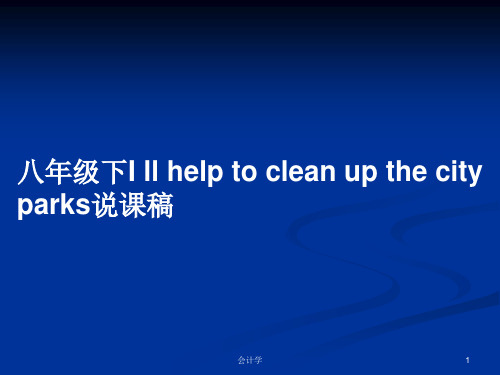
answer the reading and meanings of the phrasal
verbs in 4a.Then ask them to finish the tasks. Check
the answers by their deskmates and then ask them
to summarize the phrases: want to do, hope to do,
Purpose of my designing: To check if the students have mastered the use of infinitives
.
第11页/共15页
Part Four —— Teaching steps
Step4.Summarize
1). Review new words and structures students learnt, 2).Summarize the use of infinitives. 3). The ways to help others. .
第4页/共15页
Part Two —— The Teaching Methods
1 .Communicative teaching method 2 .Task-based teaching method 3. Audio-visual teaching method. We all know that the new target teaching is to improve students’ abilities of listening, speaking, reading, writing and their good sense of the English language. So in this lesson I’ll mainly use communicative teaching method and task-based teaching method.
- 1、下载文档前请自行甄别文档内容的完整性,平台不提供额外的编辑、内容补充、找答案等附加服务。
- 2、"仅部分预览"的文档,不可在线预览部分如存在完整性等问题,可反馈申请退款(可完整预览的文档不适用该条件!)。
- 3、如文档侵犯您的权益,请联系客服反馈,我们会尽快为您处理(人工客服工作时间:9:00-18:30)。
( )1. The woman ___all of her money to charities____ the poor.A. gave off, to helpB. gave up, helpingC. gave away, to helpD. gave, helping ( ) 2 Your bedroom is too dirty, please _____.A. clean it upB. clean up itC. set it up( )3 The ___ girl was sent to hospital by her mother yesterday.A. sickB. illC. goodD. well( )4 —My grandfather was ill _____ last week. —I’m sorry to hear that.A. in a hospitalB. in the hospitalC. in hospitalD. in hospitals ( ) 5 You could visit _____children in the hospital and _____them______.A. ill, set, upB. sick, clean, upC. sick, cheer, up D ill,cheer, up ( )6 He looks sad .Let’s ___ him___.A. cheer , upB. put, upC. set upD. call, up( )7. —He looks unhappy today. —Let’s_______. A. cheer him up B. help out him C. look him after D. argue with him ( ) 8 You shouldn’t _____your hope. Everything will better.A. give upB. fix upC. cheer upD. put up( ) 9 We have raised some books. We’ll ___to the poor children.A. put them upB. give them awayC. give them away.D. put out them ( )10. Many social workers went to Ya’an to help clean water and food to local people to reduce their pain from the earthquake.A. put outB. come outC. work outD. give out( )11. —It is too noisy here. I can’t stand it.—Me, too. We have to________ new ways to solve the problem.A. catch up withB. keep up withC. come up with( )12 . He ______lots of money to the people in the earthquake area ______.A. put out, to work out wellB. handed out, help them outC gave out, work out well D. gave away; to help them out( ) 13 He used to ____short and ____ short hair when he was young.A. have; beB. be; haveC. be; beD. have; have( ) 14 My brother used to _____ up late, but now he is used to ___ up early.A. get getB. getting; getC. get; gettingD. getting; getting( ) 15 Keys are used ___ the door.A. to openB. to openingC. openD. opening( )16. –How does Jack usually go to work?—He ______ drive a car, but now he ______ there to lose weight.A. used to; is used to walkB. was used to; is used to walkingC. was used to; is used to walkD. used to; is used to walking( )17. My parents getting up early on weekdaysA. used toB. be used toC. was used toD. are used to( )18. She live with her grandparents , but she doesn’t now.A. used toB. is used toC. was used to( )19. She ____ live alone. But she _____ living alone because she feels lonely.A. used to; doesn’t used toB. is used to; was used toC. used to; is not used toD. was used to; doesn’t used to( ) 20 The old man lives ___,but he never feels ____.A. alone lonelyB. lonely; aloneC. alone; aloneD. lonely; lonely( )21 . His grandparents live ____ in a small house, but they don’t feel _______.A. lonely; aloneB. alone; lonelyC. lonely; lonelyD. alone; alone ( )22. My old neighbor Charles felt _______ after his children moved out.A. lonelyB. safelyC. angrilyD. happily( )23 —Which dress do you like best, Madam?—Sorry, I can’t decide _____ now.A. to buy which oneB. buy which oneC. which one to buyD. which I should buy it.( ) 24 We should try ___ much fruit.A. eatB. to eatC. eatingD. eats( )25 . Scientists are trying their best to _______ ways to treat the terrible disease called H7N9.A. come up withB. look forward toC. talk aboutD. give up( )26. The great writer has written many stories for children.It is said that a new one will ______ at the end of this month.A. go outB. come outC. look outD. run out( )27 There used to be lots of fish in the lake. —Yes, but there are very __________ now.A. fewB. fewerC. littleD. Less( )28 The girl in purple is new here, so ___ people know her.A. few B .a few C .a little( )29. To live a green life, we should try to save ______ energy and produce_______ pollution.A. more; lessB. less; moreC. more; fewerD. most; least( )30. The world’s population is growing _____and there is ____land and water for growing rice.A. more; lessB. larger; fewerC. larger; lessD. more; fewer( )31.Rememer this, children_____careful you are , _______mistakes you will make . —We know , Mr. Li .A. The more; the moreB.The fewer; the moreC. The more; the fewerD. The less; the less( )32. -Many boy students think math is ______ English.-I agree. I’m weak in English.A. much difficult thanB. so difficult asC. less difficult thanD. more difficult than( )33 —Do you ____after your mother or your father?—My father . We both have big eyes and black hair.A. lookB. takeC. run D see( )34 The girl _____ the woman. Maybe she is her daughter.A. take careB. takes afterC. takes offD. look after( )35 Tom ___ his father, because they both are cheerful and easygoing. A. looks like B. takes after C. doesnt’ take after D. isn’t like ( )36 .My bike is broken. Could you help me to ?A. fix it upB. set it upC. make it upD. put it up( ) 37 Mary is very similar ____her sister in appearance.A. inB. toC. withD. for( )38 Her sweater is ___ to my sister’s . They are the ____ color.A. similar; sameB. similar; similarC. same; sameD. same; similar ( )39 Can you tell the differences between two pictures?Oh , They look quite ___. A. different B.similar C.strange D.interesting ( )40 —What are you doing, Uncle Wang?—I am sorting out old books and I’ll ____ to kids in West China.A. give them upB. give them awayC. give them offD. give them in ( )41. Andrea Bocelli never which makes him a successful singer. A. takes away B. gives away C. gets up D. gives up( ) 42—My mother can’t imagine ____ on line.—Many people don’t know how to do it.A. shopB. to shopC. shoppingD. Shopped( )43 The Internet is so closely connected with our daily life . Can you ___ a life without it? A. understand B.imagine C.consider D.expect ( )44 —I have a great ____ in finishing the work by myself. Could you help me —No problem. A.fun B.success C.advice D.difficulty ( )45—What _____ news! --Yes. We are all _____ about it.A. exciting; excitingB. excited; excitedC. exciting; excited D excited exciting( )46 Everyone was ___ when they heard the ___ news.A. exciting; excitingB. excited excitingC.exciting; excited( )47—Oh ,I’ve left my schoolbag in the classroom.—Don’t worry. I’ll ___it for you. A. bring B. get C. carry D. take( ) 48 The teacher told the students ____ any food into the classroom .A. not to bringB. not bringC. don’t bringD. to bring not( )49 —Don’t forget ____ your history and politics books tomorrow morning.A. bringB. to bringC. bringing( )50.—How are you going to be a basketball player ?—I every day.A. am going to practice basketballB. am going to study mathC. am going to take acting lessonsD. am going to study computer science( )51.—Sam, my iPhone is in my bedroom. Could you _____ it for me? —No problem. A. bring B. fetch C. take D. carry ( )52.-I’m sorry, Mr Li. I ______ my English homework at home. -Don’t forget it to school tomorrow.A. left, to bringB. forgot, to takeC. lost, to bring( )53. Please hold on to your dream ______ one day it comes true.A. ifB. untilC. unlessD. though( )54. —Would you like to go shopping with me, Carmen?—I’d love to, _____ you don’t want to go alone.A. untilB. beforeC. if D because( )55. The children will climb the hill if it___________ tomorrow.A. won't rainB. didn't rainC. isn't rainingD. doesn't rain( )56. If Nancy ______ the exam, she will go to Australia for English study.A. passB. passedC. passesD. will pass( ) 57—You study so hard that you’re sure to pass the exam.—Thank you for ___ so. A. say B. to say C. saying D. said( )58. ________ the teacher, I’ve made great progress.A. Thank youB. Thanks toC. Thanks lot D Thanks for( )59. _____ her husband,she has now become a famous film star.A. BecauseB. Thanks toC. Thanks forD. With the help( ) 60 If you want to change the world, you have to ___ yourself first. A.enjoy B.check C.help D.change ( )61. They plan to ________a food bank to help homeless people.A. set offB. set outC. set inD. set up( )62. You can ______some signs to tell people about it.A. put onB. put upC. put offD. put away( )63. Can you _______a solution to the problem?A. think overB. think ofC. think aboutD. think up( )64. Jack _______his father. They are both tall and outgoing.A. looks likeB. likesC. is likeD. takes after( )65. My math teacher ________my mobile phone because I used it at class.A. took awayB. took outC. took care ofD. took after( )66. The problem was too difficult for me to _________.A. work outB. work it outC. work out itD. work on( )67. His duty is to ________food to hungry people in the food bank.A. work outB. give outC. take outD. put out( )68. Please _______the windows. It’s much too cold outside.A. turn offB. shut upC. openD. shut( )69. —How many teachers are there in your school? —, but I'm not sure.A. Hundreds B Hundred C. Hundreds of D. One hundred( )70. I don’t know ________.A. who is the manB. who the man isC. who did come yesterdayD. who are you going with( )71. Her cell phone number is 1356789900. Please ________.A. write it downB. write down itC. write them downD. write down them( )72. Everyone wants to do ________he is interested in.A. thatB. whatC. all whatD. how( )73. The ________man lives ________.A. alone, aloneB. along, lonelyC. lonely, lonelyD. lonely, alone( )74.Miss Smith has made ________interesting for us students to learn English by establishing English study group.A. itB. thisC. thatD. her( )75. She made a decision _________for a volunteer after-school program.A. trying outB. handing outC. to try outD. to hand out二单词填空(10分)1. After the earthquake(地震), lots of people became h ________, so they had to live outside.2. My bike is b__________. I’ll fix it tomorrow.3. A car has four w_________.4. He’s in trouble. Let’s help him o________.5 Studying English is__________(use)6 They often v______________ the children7 We are e_____ about the exciting news .8 You could help c________ a football team for the little kids.9 Because your k_____________, I got a special trained dog.10 Lucky is a really f___________ dog. He can help me a lot. 三句子改写(15分)1.Thank you again. You changed my life.(合并为一句)_________again ______ _________ my life.2. She often sings to cheer up the sick people.(同义句)She often sings to _______the sick people ________.3. Tommy takes after his mother. (同义句)Tommy _________ ________ ________to his mother.4. I used up my money last Sunday. (同义句)My money _______ ________last Sunday.5.I’d like to help people who don’t have home. (同义句)I’d like to ________ ____________ __________.6. Lisa was excited about meeting an old friend of hers.Lisa was excited_________ _________an old friend of hers.。
